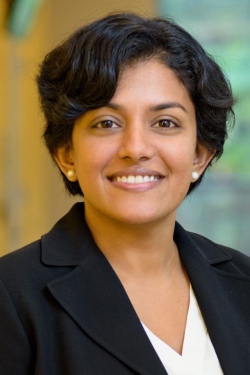Graduate Seminar Series
January 20, 2023
10:00 a.m. ET
7500 Wean Wall
January 20, 2023
10:00 a.m. ET
7500 Wean Wall
The Jayaraman research group members’ expertise lies in development of coarse-grained models and computational approaches involving liquid state theory, molecular simulation, and machine learning for designing and characterizing soft macromolecular materials. In this seminar, I will present the group’s method ‘Computational Reverse Engineering of Scattering Experiments (CREASE)’ that we have developed for analysis of small angle scattering profiles and interpretation of the structure in soft materials. CREASE has two steps: the first step involves a genetic algorithm (GA) and machine learning to determine the relevant structural dimensions for the system at hand whose computed scattering profile matches the input experimental scattering profile; the second step uses molecular simulations to reconstruct molecular-level packing within those structural dimensions. For validation of this CREASE-GA step, we take as input scattering intensity profiles from a variety of structures with known shapes and dimensions and demonstrate that CREASE-GA can produce outputs that match those known shapes and target dimensions. After validation we apply CREASE to experimental small angle X-ray and neutron scattering profiles from different soft materials (e.g., methylcellulose fibrillar structures, micelles in amphiphilic polymer solutions, segregation in binary nanoparticle mixtures) to test various hypotheses regarding the domain shapes and sizes within the structure and calculate the relevant structural dimensions. Through these examples, I will show CREASE’s ability to interpret structural detail at a range of length scales for soft materials without relying on fitting with off-the-shelf analytical models that may be too approximate for novel polymers and/or unconventional assembled structures. I will end the talk with our recent work where we use CREASE’s structural interpretation as an input for other computational methods that predict macroscopic properties (e.g., color, reflectance profiles) thus serving as a valuable tool for predicting structure-property relationships.
 Arthi Jayaraman is currently Centennial Term Professor for Excellence in Research and Education in the Departments of Chemical and Biomolecular Engineering and Materials Science and Engineering at the University of Delaware (UD), Newark. She is currently the director for an NSF-funded NRT graduate traineeship program on ‘Computing and Data Science Training for Materials Innovation, Discovery, and Analytics’. She also serves as editor for both American Chemical Society (ACS) journals Macromolecules and ACS Polymers Au (gold). Jayaraman received her Ph.D. in Chemical Engineering from North Carolina State University and conducted her postdoctoral research in Materials Science and Engineering at University of Illinois-Urbana Champaign. After holding the position of Patten Assistant Professor in the Department of Chemical and Biological Engineering at University of Colorado (CU) at Boulder, in 2014 she joined the faculty at UD. Jayaraman’s research expertise is in development of molecular modeling, theory and simulation techniques and application of these techniques to study polymer nanocomposites, blends, and solutions, and biomaterials. She has received the following honors: AIChE COMSEF Impact Award (2021), American Physical Society (APS) Fellowship (2020), Dudley Saville Lectureship at Princeton University (2016), ACS PMSE Young Investigator (2014), AIChE COMSEF division Young Investigator Award (2013), CU Provost Faculty Achievement Award (2013), Department of Energy (DOE) Early Career Research Award (2010), and CU Department of Chemical and Biological Engineering’s outstanding undergraduate teaching award (2011) and graduate teaching award (2014).
Arthi Jayaraman is currently Centennial Term Professor for Excellence in Research and Education in the Departments of Chemical and Biomolecular Engineering and Materials Science and Engineering at the University of Delaware (UD), Newark. She is currently the director for an NSF-funded NRT graduate traineeship program on ‘Computing and Data Science Training for Materials Innovation, Discovery, and Analytics’. She also serves as editor for both American Chemical Society (ACS) journals Macromolecules and ACS Polymers Au (gold). Jayaraman received her Ph.D. in Chemical Engineering from North Carolina State University and conducted her postdoctoral research in Materials Science and Engineering at University of Illinois-Urbana Champaign. After holding the position of Patten Assistant Professor in the Department of Chemical and Biological Engineering at University of Colorado (CU) at Boulder, in 2014 she joined the faculty at UD. Jayaraman’s research expertise is in development of molecular modeling, theory and simulation techniques and application of these techniques to study polymer nanocomposites, blends, and solutions, and biomaterials. She has received the following honors: AIChE COMSEF Impact Award (2021), American Physical Society (APS) Fellowship (2020), Dudley Saville Lectureship at Princeton University (2016), ACS PMSE Young Investigator (2014), AIChE COMSEF division Young Investigator Award (2013), CU Provost Faculty Achievement Award (2013), Department of Energy (DOE) Early Career Research Award (2010), and CU Department of Chemical and Biological Engineering’s outstanding undergraduate teaching award (2011) and graduate teaching award (2014).
December 5 2025
12:45 PM ET
Materials Science and Engineering
"Bridging AI and Quantum Materials: Opportunities and Challenges” presented by Mina Yoon, Oak Ridge National Laboratory
7500 Wean Hall
December 10 2025
8:30 AM - 5:00 PM ET
Materials Science and Engineering
Molecular Engineering of Soft Materials Symposium
The symposium will highlight cross-disciplinary research across CMU departments, with the goal of advancing soft materials research.
5201 Scott Hall
December 11 2025
4:00 PM ET
Materials Science and Engineering
M.S. Program Information Session
Join us online to learn more about becoming part of the graduate student community through our master's degree programs.
Virtual